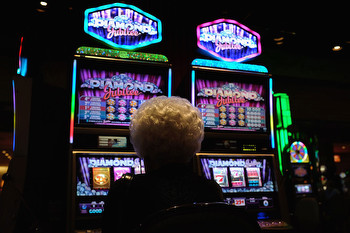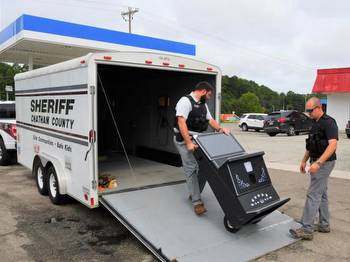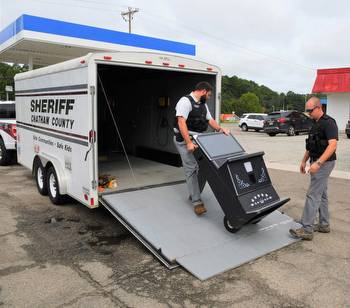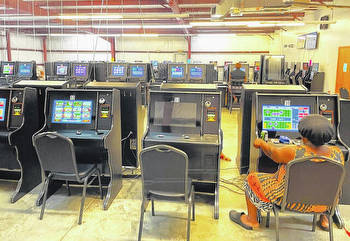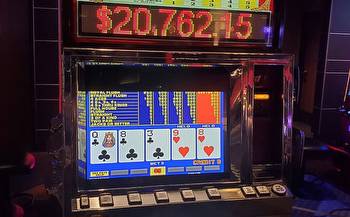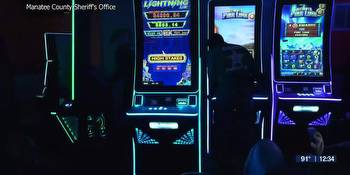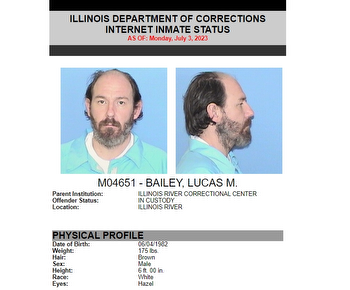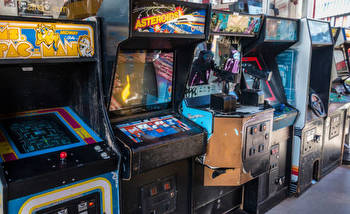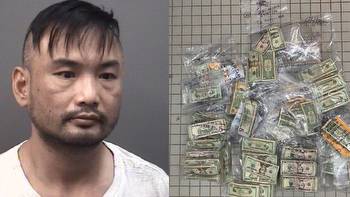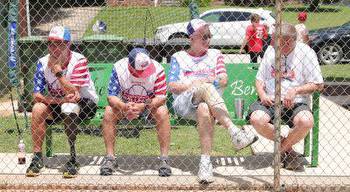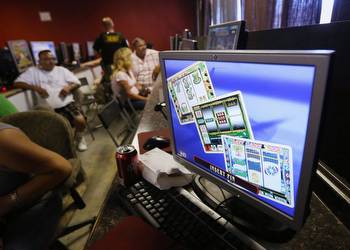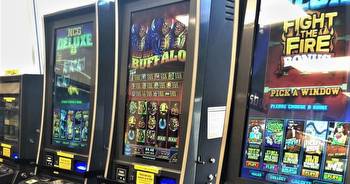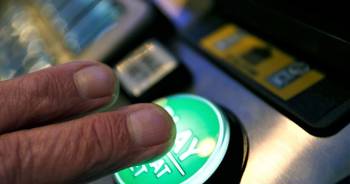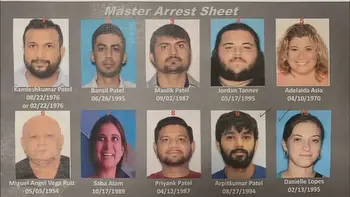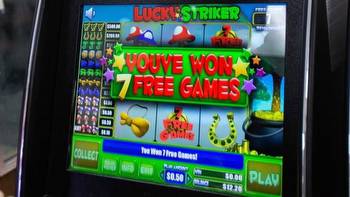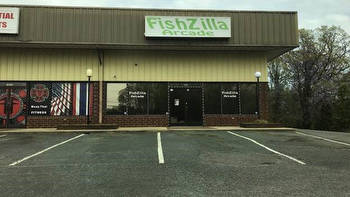Video gambling legislation advances as GOP softens its stance

Sheriffs and advocates remain opposed, but the party of Donald Trump is no longer a roadblock
Video gambling is a long-time target of laws and law enforcement in North Carolina. State legislators are now considering a bill that would make video lottery games legal and use some of the gamblers’ money for community college student loans.
House Bill 954 passed the House Commerce committee on August 31. It was scheduled to be considered in the House Finance Committee on Thursday, but was removed from the calendar on Wednesday.
Under the bill, the state Lottery Commission would license and regulate machines.
Operators, those who own or lease the machines, would get 35% of the revenue; 25% would go to merchants that offer the games; and at least 32% would go into a new North Carolina Video Lottery Fund. The state’s public HBCUs would each receive $2 million a year to improve graduation rates, student success or “sustainability of the institution.”
The bill’s main sponsor, Rep. Harry Warren, a Republican from Salisbury, told legislators that the proposal would cut sweepstakes machines in the state by 65% to 70%, WRAL reported.
Warren could not be reached this week. An email from his legislative assistant Monday said he does not do interviews.
A longstanding enforcement battle
The state has been playing Whack-A-Mole with video gambling for years.
The legislature voted overwhelmingly at least three times, in 2006, 2007, and 2010, to ban the machines. With each new law, operators modified the games in ways they believed would escape the ban.
Video gaming operators sued, but the state Supreme Court upheld the ban in 2012.
This June, the state Supreme Court ruled again, holding that a game a company called Crazie Overstock Promotions said involved both chance and skill was mostly chance and unlawful.
Despite attempts to outlaw them, the machines remain ubiquitous in the state, drawing players to gas stations, convenience stores, and standalone gambling businesses that operate openly.
Rep. Howard Hunter, a Democrat from Ahoskie and one of the bill’s sponsors, said it make sense for the state to regulate the games.
“We need to regulate those sweepstakes halls,” he said in an interview. “They’re popping up everywhere in my neighborhood.”
The sheriff’s office in Warren’s home county of Rowan aggressively pursues sweepstakes businesses, conducting raids and undercover operations.
Electronic games that have players shoot fish are popular. The Rowan County Sheriff’s Office raided the Salisbury business FishZilla Arcade last month, WBTV reported.
Since February 2020, the Rowan Sheriff’s Office has executed nine search warrants on gaming businesses, conducted about 20 undercover gaming-related investigations, seized about $1 million and hundreds of machines, and charged 16 people, Chief Deputy David Ramsey said in an email.
He estimated that the county has 1,000 illegal machines.
“The investigations have shown that arcades operate much like casinos, whereas they have darkened spaces, usually no clock, provide refreshments, and have ATMs,” he wrote.
Ramsey, who said he’s worked undercover in the businesses, said the operations prey on people who can least afford to lose money, with people betting their paychecks, stimulus money, and unemployment benefits.
The NC Sheriffs’ Association opposes video sweepstakes.
Eddie Caldwell, the association’s executive vice president, said the bill does not offer a way for local law enforcement officers to know whether a machine has a state permit or whether gambling locations are exceeding their allowed limits.
The bill does not make the games illegal, Caldwell said. Warren has said that existing machines would be outlawed, Caldwell said, but the bill doesn’t do that.
“We suggest it be clarified so it’s crystal clear,” Caldwell said.
Not all law enforcement agencies pursue video gambling parlors as vigorously as the Rowan Sheriff’s Office.
Caldwell said he couldn’t pinpoint a reason. But sheriffs’ offices get calls from residents who say their loved ones are blowing the household budget at gambling halls that they know are illegal, Caldwell said, they want them shut down.
Those residents don’t know their legislators or anyone else to call, he said. “They know who the sheriff is.”
A GOP sea change
The sweepstakes bill isn’t the only gambling bill that’s gained traction this legislative session. The Senate passed a bipartisan bill last month that legalizes sports betting, though most Republicans in the chamber voted against it.
These bills represent a shift in some state Republicans’ views on gambling, which their party platform once opposed.
The state lottery passed in 2005 with no Senate Republicans voting in favor. A Republican senator who was absent for the vote and did not actively oppose the lottery lost his primary the following year.
The Republican position on gambling has morphed since then.
The Christian Action League criticized the GOP decision to weaken the party platform’s language on gambling in 2014, when the state GOP held its convention at Harrah’s Cherokee Casino.
The Republican Party’s national standard-bearer, former President Donald Trump, is a former casino owner and Las Vegas casino mogul Steve Wynn was a prominent GOP donor.
The state GOP platform is now silent on gambling.
Advocates express concern
The proliferation of illegal video gambling points to the fallacy behind one of the rationales for having a state lottery – that it would eradicate illegal gambling, said Les Bernal, a national director for Stop Predatory Gambling, a nonprofit that opposes state-sponsored gambling.
“The more state governments like North Carolina promote predatory gambling, the more it normalizes it,” he said. “It normalizes that it’s okay to rip off people with these gambling machines. You create thousands of mini-casinos across the state.”
State-sponsored gambling shifts the tax burden onto low-income people, who are disproportionately Black and brown, Bernal said.
In 2012, Illinois began allowing video gaming in businesses with liquor licenses, unless jurisdictions opted out.
The Illinois law was pitched as a way to help restaurants, said Anita Bedell, executive director of Illinois Church Action on Alcohol and Addiction Problems. But other kinds of businesses, including a flower shop, a beauty salon, and laundromats, pursued liquor licenses and added the machines, she said. The state also has standalone gambling cafes.
State-sanctioned video gambling operates alongside video sweepstakes machines that are unregulated and untaxed, she said.
A 2019 ProPublica investigation called video gaming in the state a “botched money grab”, where machines were more likely to be found in low-income communities.
ProPublica counted more locations in Illinois with video gaming outside casinos than in any other state that allows it.
Bedell said the Illinois Gaming Board routinely legalizes additional machines.
“You can’t control it,” she said.








